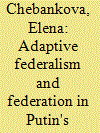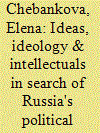|
|
|
Sort Order |
|
|
|
Items / Page
|
|
|
|
|
|
|
| Srl | Item |
| 1 |
ID:
084648


|
|
|
| 2 |
ID:
136930


|
|
|
|
|
| Summary/Abstract |
Following the events that ensued after the December 2011 Russian parliamentary elections, the study of civic activity in Russia became highly topical. We can make two immediate observations on the nature and methodology of research on Russian civil society. First, the media and some academic critics tend to equate Russia's civil society with the liberal opposition to Putin's government. While liberal oppositional movements undeniably have a civic character and represent a significant part of Russia's civil society, much of Western analysis tends to appropriate this opposition's narrative for the purpose of narrating Russia's entire civic activism. Hence, these critics often focus on what they see as suitable, relevant, and reflective of the political and philosophical consensus prevalent in the West. As a result, those movements, personalities, and ideas that mirror core European political values receive wide analytical and media focus, while others that fall beyond the bounds of the existing liberal consensus are shelved, considered irrelevant or even plain erroneous. Yet, those ideas, which may appear at first glance to be at odds with the contemporary Western context, may prove upon close examination to be of the most immediate political significance for Russia.
|
|
|
|
|
|
|
|
|
|
|
|
|
|
|
|
| 3 |
ID:
152138


|
|
|
|
|
| Summary/Abstract |
The intellectual discourse of any state can function within two broad paradigms: consensual and pluralistic. In the first case, political elites, intellectuals, and the public agree on the base parameters of what constitutes “the good life” and argue about the methods of application. In the second case, participants hold radically different, incommensurable views, which coexist in society. This essay argues that the Western political system broadly rests on the politics of liberal consensus, formed throughout the period of capitalist modernization. But Russia's history took a different turn, following a path of alternative modernization. This engendered the politics of paradigmatic pluralism, in which a number of radically different politico-intellectual frameworks struggle for the dominant discourse. This essay examines these paradigms and argues that, due to the nature and substance of these models, fundamental change of Russia's dominant discourse, along with its main politico-institutional parameters, is unlikely.
|
|
|
|
|
|
|
|
|
|
|
|
|
|
|
|
| 4 |
ID:
077247


|
|
|
|
|
| Publication |
2007.
|
| Summary/Abstract |
This article provides an analysis of the institutional mechanisms that are required to ensure the effective functioning of federalism in Russian politics. A common contention in the literature on federalism is that, in addition to fundamental requirements such as the constitutionally defined division of powers between the federation and its constituent units, and the supremacy of the federal constitution, some ancillary structures are necessary. Of particular importance are institutions of inter-governmental co-operation, transparent means for the mobility of officials between the centre and the regions, and integrated systems of national parties. The functioning of these institutions must also reflect the culture and ethic of federalism. This article examines how well these three factors have been implemented in Russia in the course of Putin's reforms. It is shown that a preliminary network of such institutions has been created. However, their operational ethic, and in particular the lack of commitment to federal values, it is argued, could act as an impediment to the successful evolution of the federal state in Russia
|
|
|
|
|
|
|
|
|
|
|
|
|
|
|
|
|
|
|
|
|